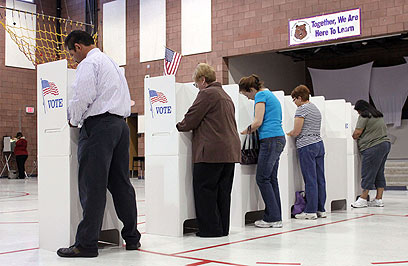


Republicans rode a wave of voter discontent and conservative outrage to capture a House of Representatives majority from President Barack Obama's Democrats on Tuesday, ending the Democrats' reign after just four years and building a bulwark against Obama's agenda.
The Republican party – energized by the ultraconservative Tea Party movement and voter disillusionment with Obama, incumbents and high unemployment – captured at least 53 seats from Democrats, and would exceed the 40 needed to gain a majority.
They made big gains also in the Senate but fell short of a majority.
Republicans led in another 13 districts. Democrats had only picked up 2 Republican seats.
A Republican takeover of the House would foist a divided government on Americans, complicate Obama's agenda and could lead to attempts to repeal his sweeping health care reform legislation. Republicans have campaigned on cutting taxes and shrinking government.
Republicans were on track to their biggest House gains since they picked up 80 seats in 1938.
Democrats had controlled the House by a 255-178 margin, with two vacancies. All 435 seats were contested.

Tea Party movement celebrates (Photo: Reuters)
The election was a remarkable turnabout from 2008, when Obama's victory helped propel Democrats to big gains in their House majority, following the 2006 wave that swept them to power there.
Republican Leader John Boehner, in line to claim the leadership position known as speaker and become second in line for the presidency after the vice president, huddled with party leaders, careful to avoid a party-like atmosphere at a time when voters appear fed up with both parties.
"Across the country right now, we are witnessing a repudiation of Washington, a repudiation of big government, and a repudiation of politicians who refuse to listen to the people," Boehner said.
If Democrats lose the House after only four years, it would be the shortest a party has held the lower chamber since Republicans kept it for just two years from 1953-1955.
The House has the power to raise revenue through taxes and control spending, to impeach officials and to elect the president in case of a deadlock. It can also hold hearings and investigations, a cudgel that could be used to stymie the Obama administration.
House Speaker Nancy Pelosi, the first woman to wield the speaker's gavel, gathered with Democrats at a downtown hotel, her party bracing for a bloodbath.

US voters, Tuesday (Photo: Reuters)
The Republicans defeated 19 Democrats in districts won by Republican Sen. John McCain in the 2008 presidential campaign. Democrats went deep into Republican territory to win several seats that year, only to see Republicans win many back this election.
One was lost by freshman Democrat Rep. Tom Perriello of Virginia, who unapologetically supported Obama's agenda and for whom the president campaigned last Friday.
Painful lessons
Republicans took five Democratic-held seats each in the battleground states of Pennsylvania and Ohio and three in Florida and Virginia, all states Obama had managed to win in 2008. The party broke House Democrats' stranglehold on the New England region, winning a seat in New Hampshire.
A Republican won the seat that had been held by Democrat Bart Stupak, who announced his retirement after helping rescue President Barack Obama's health care plan.
Republicans said they had learned painful lessons after being chased from power in 2006 and were ready for a new start.
"Our years in the minority have chastened and disciplined our party, and tonight's elections show that the American people say it's time for our party to stop talking and start listening," said Rep. Eric Cantor of Virginia, the No. 2 Republican.
In rare a bright spot for Obama's party, Democrat John Carney handily beat Republican Glen Urquhart in the race for Delaware's only House seat. The Democrat won the race to succeed a Republican who mounted a Senate run, only to lose the primary in a stunning upset to tea party favorite Christine O'Donnell. O'Donnell lost her Senate bid Tuesday.
In predominantly Republican Kentucky, Democratic Reps. John Yarmuth won and Ben Chandler was narrowly leading in a district that McCain easily won in 2008.
But the few victories were eclipsed by the scope of potential Democratic defeats. First-termers were lagging in key races as were some of the party's old veterans. And some Democrats who stressed their independence from their party also went down to defeat.
Democratic Rep. Ike Skelton, chairman of the House Armed Services Committee and a military expert, lost after more than 30 years in Congress.
Strategists in both parties expected Republican successes that could rival the party's 1994 wave to power, which handed them 52 seats and control of the House for the first time in 40 years.
House candidates and party committees raised and spent tons of campaign cash, and Democrats had a slight edge. Republican candidates poured a total of $419 million into their campaigns, while Democrats spent $421.5 million.
But Republican-allied outside groups skewed the playing field dramatically. They spent $189.5 million savaging Democratic candidates while independent groups skewering Republicans spent $89 million.
Republican Rep. Ahn "Joseph" Cao in New Orleans, the first Vietnamese-American elected to Congress, lost after his first term to a Democrat who attacked him for voting against Obama's health care and stimulus bills.
In South Carolina, a state fraught with a history of racial tensions, Tim Scott became the first black Republican elected to Congress from the Deep South since the 1800s.
- Follow Ynetnews on Facebook















